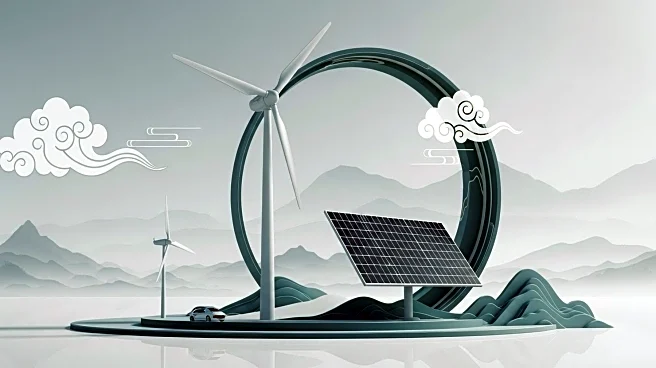What is the story about?
What's Happening?
According to BP's Energy Outlook 2025, wind and solar power are projected to meet over 80% of the increase in global electricity demand by 2035, with China leading the charge. Solar power is expected to grow more rapidly than wind due to faster declines in costs and greater policy support. This shift towards renewable energy sources necessitates enhancements in power system resilience, including flexible generation, energy storage, and advanced grid technologies. Hydropower and nuclear energy are also set to grow, while coal power's share is predicted to decline significantly, driven by reduced coal use in China. Natural gas-powered generation will rise, particularly in the U.S. and emerging economies.
Why It's Important?
The transition to renewable energy sources like wind and solar is crucial for reducing carbon emissions and combating climate change. China's leadership in this shift underscores its role as a major player in global energy markets. The decline in coal power and rise in renewables reflect a broader trend towards sustainable energy solutions, which could have significant environmental and economic impacts. For the U.S., the increase in natural gas-powered generation presents opportunities for energy independence and economic growth. However, the transition also poses challenges, such as the need for infrastructure upgrades and policy adjustments to support variable energy sources.
What's Next?
As wind and solar power continue to expand, countries will need to invest in technologies that enhance grid resilience and energy storage capabilities. Policymakers may focus on incentivizing renewable energy projects and developing regulatory frameworks that support sustainable energy transitions. The U.S. and other emerging economies are likely to increase their reliance on natural gas, which may lead to further investments in gas infrastructure and exploration. The global energy landscape is set to evolve, with renewable energy playing a central role in meeting future power demands.
Beyond the Headlines
The shift towards renewable energy sources has ethical and cultural implications, as it promotes environmental stewardship and sustainable development. The decline in coal power may lead to job losses in traditional energy sectors, necessitating workforce retraining and economic diversification. Additionally, the growth of renewables could influence geopolitical dynamics, as countries compete for leadership in clean energy technologies. The transition also highlights the importance of international cooperation in addressing climate change and ensuring energy security.

















